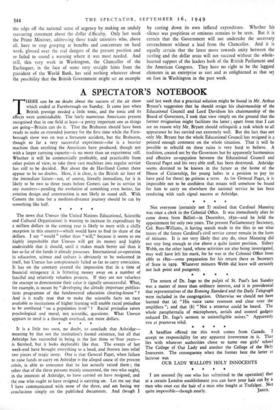A SPECTATOR'S NOTEBOOK T HERE can be no doubt about the
success of the air show which ended at Farnborough on Sunday. It came just when British prestige needed a little tonic, and the tonic and its effects were unmistakable. The fairly numerous Americans present recognised that in one field at least—a pretty important one as things are going—Britain can do it. That the Brabazon should have been ready to make an extended journey for the first time while the Farn- borough show was on was a fortunate accident, but the Brabazon, though so far a very successful experiment—she is a heavier machine than anything the Americans have produced, though not with a larger carrying capacity—is no more than an experiment still. Whether it will be commercially profitable, and practicable from other points of view, to take these vast machines into regular service has still to be decided. But about the de Havilland Comet there appear to be no doubts. Here, it is clear, is the British air liner of the immediate future—not, of course, literally immediate, for it is likely to be two to three years before Comets can be in service in any numbers—pending the evolution of something even better, for aviation design and construction is not likely to stand still. With Comets the time for a medium-distance journey should be cut by something like half.


































 Previous page
Previous page